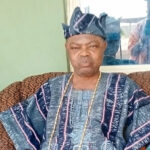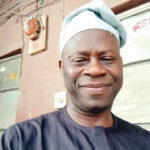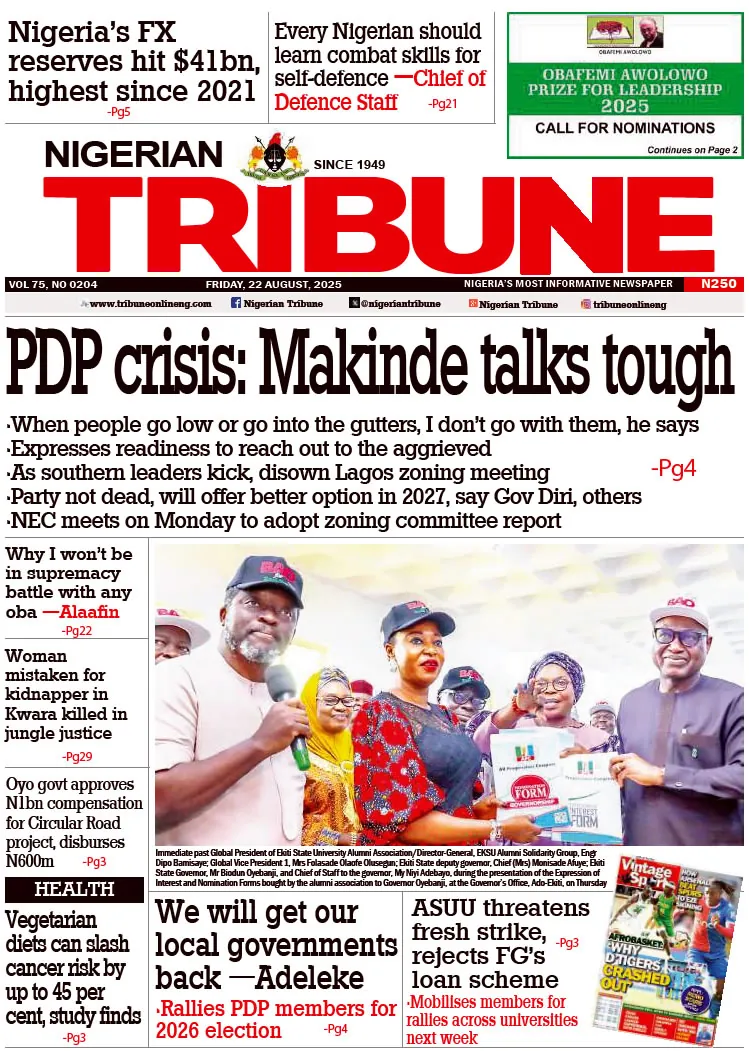His Royal Majesty, the Orangun of Oke Ila in Osun State, Oba Adedokun Abolarin, played various roles in the media space during the military and post-military era in Nigeria before he later became an oba. He tells SAM NWAOKO his media story in this interview.
How did your media journey begin, how did you venture into the media space?
I am a social scientist. I read Political Science at the University of Ife (now Obafemi Awolowo University, Ile Ife) and that put me at a vantage position with regards to issues of the society and the polity. Then I studied law. I did all my degrees at Ife. My background also helped a lot in shaping who I ended up to become. I grew up in an environment that was political and I started reading newspapers very early in life. I can say as soon as I could read and write back in the days. I grew up with the Tribune newspapers and I saw the paper pass through turbulent period of the Western Region. We had a special place where we picked the Nigerian Tribune for my father in those days because the paper had been banned by the government of the day in the region. The paper was not on the news stands during the turbulent period because it had been banned by the NNDP government in the Western Region – 1964 and 1965 before the coup of 1966. In 1964, I was just six years old.
So, in the social sciences you talk of influence, among other things you study things that influence the individual later in life. So, my background was so important to what I am today.
Also, when I was in the university, I was a member of the most powerful medium of expression in Ife back then. It was known as The Cobra. I was there with very many of my friends. Then when I became a lawyer, I was part of the Tell Magazine of those days. My company, Dokun Abolarin and Co was the company secretary of Tell Magazine. As a result, all those journalists were my friends. I was very close to them and had really close relationship with their business as a media outfit. We discussed a lot of issues and I can disclose today that many incriminating documents were kept with me. During the turbulent days of the various military governments, many incriminating documents concerning the governments of that time were in my custody.
In addition to being an insider in one of the best news magazines in the country, I was also a usual public commentator on the Nigerian Television Authority (NTA) national network; Africa Independent Television (AIT); Channels Television and so on. I was contributing to these stations and later, I became an editorialist at the Nigerian Tribune. I was a member of the Editorial Board of the newspaper. I also served as a lecturer at the Times Journalism Institute (TJI) in the 1990s and I took students on Human Rights.
It was tough during your time on the Editorial Board. It was the military era. Were you not shaken? Did your courage not waiver as a Board?
We did not fear at all. We might have considered taking some steps as means of remaining safe from the junta, but I was neck-deep in the struggle for democracy. Many of us were deeply involved and we were not scared. Again, we had our ways of doing things. We had our ways and I think that is a discussion for another day. Chief Bola Ige used to write a column for the Nigerian Tribune called Uncle Bola’s Column. When he was appointed a minister, he wrote me a letter. That letter was like a testimonial. In it he informed three of us to continue to write the column on his behalf. Professor Akin Onigbinde (then he was lecturing at the Ogun State University); Odia Ofeimun and myself had that mandate. It was a privilege. I had to move to Abuja and I was always contributing to Programmes on TV. I almost became a broadcast media person because I was always on TV programmes as ‘public affairs commentator’. However, my major interest was how this country could be better. I was openly interested in how this country should be run. As a traditional ruler today, I am now passive and only pray that things are done the right way in Nigeria.
I really cherish my Tribune years. We had an Editorial Board that was a fine mixture of town and the gown. We had Mr. Folu Olamiti, Professor Wale Adebanwi, Prof. Adeola Adenikinju, Mr. Muyiwa Apara, Dr. Noma Owens-Ibie, Dr. Festus Adedayo, Dr Segun Olatunji and others who constituted that viable and fearless editorial board then. I also treasure my relationship with Tell Magazine. Why should people like Nosa Igiebor, Onome Osifo-Whiskey, Dele Omotunde, Dare Babarinsa, be forgotten? There were a lot of others. When you picked the papers then, you were excited to read. As far as I’m concerned, these people deserve national honours. They struggled for our democracy.
You were in the media when the country was volatile and government hostile. By that I mean you were part of it when the media fought the military to a standstill. Do you still see the media in that mould?
Yes I saw the media when it was explosive indeed. Exactly as you said, the media fought the military to a standstill. However, unfortunately, I do not see the media today in the same mould as that time. I don’t because the dynamics have changed. The circumstances are different now. There are too many things to grapple with. That might be because of the advent of the social media. There are so very many pieces of information, from very many angles which people need to process nowadays. Sometimes, one doesn’t just understand what it is exactly. But the dynamics are very different from the days when we were there. However, it is still very important to always keep the government and those people who are in charge of the affairs of men, in check. That is why the media is referred to as the ‘Fourth Estate of the Realm’ and a major institution to drive democracy. If you look at what is happening in the United States of America now, regardless of the negatives, you still see the media pursuing the agenda to put the democracy of the USA properly. Things might not be as we had them before, but it is still important for us to be watchful and always put the government on its toes.
When you look at the past and now, do you see a transformed media or do you see a media industry brought to its knees over time because of the economic and sundry unfavorable situations in the country?
I think because of the economic situation and several other factors, we can no longer see many of many of the kind of pungent writers of old. We loved to read Chief Tola Adeniyi. We loved to read Labanji Bolaji, we loved to read Chief Bola Ige; you wanted to read Bisi Onabanjo, you wanted to read Labanji Sam – Sam Amuka Pemu; you wanted to read Stanley Macebuh, you want to read Peter Pan and the other powerful writers of old. With all due respect to the writers of today, how many writers do we even have now to look forward to? I know that people are fond of Lasisi Olagunju, Festus Adedayo, Dele Momodu and a few others today. However, generally speaking, the kind of drive and the zeal about the country which we had back in the days are not there anymore in many people who write today.
The social media has a lot of influence on what is done in the industry. It’s so much that a section of Nigerians has called for some form of regulation of the social media. What do you think?
I think so but at the same time it should be done in such a way that it will not deprive the media as an industry that right, privilege and duty of informing, educating and enlightening Nigerian. Those roles by the media are very important to nation-building. The mass media shapes opinions and educates the populace. No regulation should remove these essential ingredients from the media.
There should be legislation if we want to regulate what happens in the Nigerian social media space but such legislation must not infringe on the constitutional rights of Nigerians.
Today as a traditional ruler, your outlook has changed even though you have remained in your quest to get the best for the country. When you look around you and look at governance today, would you say your advocacy or struggles for a better Nigeria have yielded results? Are you encouraged?
I know that democracy is not a thing you get overnight, the same thing with nation-building. Despite the long years of American democracy, they are still battling with democracy as it were. It is a process. We will get there but it may not be in our lifetime. I keep telling people, I keep saying “in your own little corner, fix it”. Democracy is not just a form of government alone, it is a way of life. Tolerance and compromise are among the ingredients of this life. The problem I have with very many Nigerian men and women is that is that we are not futuristic. We are men and women of today, especially the Nigerian elite. That’s why we celebrate things that are not to be celebrated. We celebrate inanities. A whole lot of Nigerians don’t have implicit faith in Nigeria because of this. A whole lot of people don’t have faith in Nigeria and many things we do in Nigeria. I’m an advocate of indigenous products. I’m an advocate of the cultures, the tradition and the languages of our people. We must be proud of who we are. When we lay emphasis on things that are indigenous to us, you would see that the world will appreciate us along that line. Look at our entertainment and music industries, why can’t we proceed from there? What about highlighting our food culture, our dress culture?
The media has been playing the role of shaping opinions over the years. If you are to prescribe, what would you advise the media to do now to either help guide or beat the ruling class into line?
I think there is the need to lay more emphasis on rural advocacy. We don’t tend to cover the rural people. It’s like they don’t have rights. The government too is way too far away from the people and this is probably because you cannot say that there’s local government in Nigeria, stricto sensu. I think the media should focus more on the coverage of the rural areas. I’ve seen so many talents in the hinterlands, in terms of brilliance, hard work, creativity and so on. But because very many of our students at the local level are deprived, they can’t proceed beyond where they found themselves. People just stay in the towns and cities and forget the rural areas and the numerous talents there and the beautiful environments.
As regards guiding or beating the ruling class into line, I’m okay with whichever way you look at it. For me, since I became the king, I’m always happy to pride myself as an advocate of the rural poor.
Having seen it all through your years in and long association with the media profession, would you support the coming of a rural media outfit that can tick all the boxes you have presented, something coming from the rural to the urban, instead of the other way round as we know it?
I always encourage a lot of our people to look towards the hinterland. I tell them that it’s a kind of looking inwards and looking away from the vagaries of the city. But they always say they are in the business to make money and ask me how much they would make if they concentrate on the rural people. And indeed, how much are they going to make? They must pay salaries, and also fund some aspects of their operation. They would also take care of their operation. And the cost of all these is so high. I understand this but we can still do something to help ourselves. Even if the media devote 10 per cent of their time to the hinterland, this would change many perspectives about us and our own outlook too.
READ ALSO FROM NIGERIAN TRIBUNE
WATCH TOP VIDEOS FROM NIGERIAN TRIBUNE TV
- Let’s Talk About SELF-AWARENESS
- Is Your Confidence Mistaken for Pride? Let’s talk about it
- Is Etiquette About Perfection…Or Just Not Being Rude?
- Top Psychologist Reveal 3 Signs You’re Struggling With Imposter Syndrome
- Do You Pick Up Work-Related Calls at Midnight or Never? Let’s Talk About Boundaries







